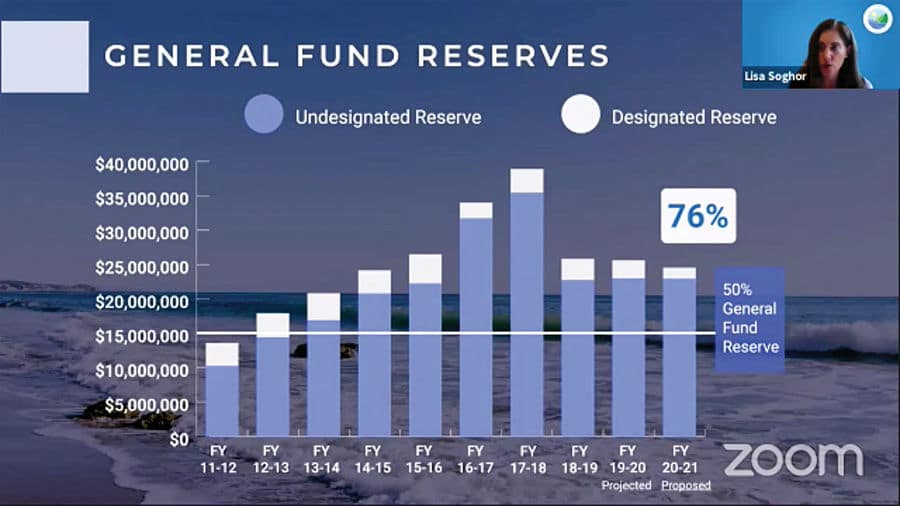The City of Malibu will have a balanced budget for fiscal year 2020-21—assuming there are no other disasters.
“We don’t know if there’ll be another disaster—we didn’t think this would happen,” City Manager Reva Feldman said about the novel coronavirus emergency, during a special city council meeting on Wednesday, April 29, where she and Assistant City Manager Lisa Soghor presented the proposed budget. “We don’t know if there will be another fire and there could also be an earthquake.”
The proposed budget for the fiscal year starting July 1 manages to maintain a general fund annual revenue of $30.13 million and a general fund annual expenditure of $30.16 million—a projected shortfall of just $30,000.
Those predictions are conservative, both Feldman and Soghor said, but they are not foolproof.
According to one slide in the budget presentation, delivered virtually at a Zoom meeting (due to City Hall’s continuing closure during the COVID-19 pandemic), city staff used their best estimates to determine when and to what extent the local economy would restart.
The budget assumes Malibu will be under existing stay-at-home orders until May 15. It assumes local businesses will be operating in limited capacity over the summer. It predicts both tax revenues and permit fees will be impacted. But it is far from a worst-case scenario.
“The proposed budget does not contemplate a second wave of COVID-19 cases requiring additional closures of businesses,” the slide read. “Nor does it anticipate any significant decline of the city’s property tax revenue.”
Property tax revenue makes up the City of Malibu’s single largest revenue source, and it is one officials are banking on to keep coffers full.
“The strength of the city’s assessed values and subsequent property taxes will help the city weather the impacts of the COVID-19 pandemic,” Soghor said, before citing charts tracking sharply decreased sales tax and transient occupancy tax (hotel tax) revenues over the years since the Woolsey Fire and continuing into 2021.
Through it all, Soghor and Feldman have maintained a general fund undesignated reserve well over the amount stipulated by council—50 percent of the city’s annual general fund operating budget. That reserve currently sits at 70 percent of the annual budget.
This was achieved partially through an injection of funds from a settlement over the Woolsey Fire provided by Southern California Edison (which will be used toward rebuilding costs including salaries of staff working on fire rebuilds) and partially by each city department trimming fat, combing through budgets to cut back wherever possible.
“To trim expenditures, all department heads looked carefully at their annual budgets and reduced travel, training, operating supplies, printing, professional services and any non-essential expense,” Soghor explained, adding that city staff would also not be receiving their annual cost of living salary increases.
Some pet projects, including environmental priorities such as implementation of the Dark Sky Ordinance for commercial properties and implementation of the dumpster lid ordinance, in addition to enhanced services for homelessness, were also to remain unfunded for the next fiscal year.
There were mixed feelings among council members as to whether the budget was conservative enough.
“I just want to make sure we’re being super conservative because I don’t want this to go south on us,” Council Member Skylar Peak said, predicting times “could be a little worse in the future” rather than better, given the uncertainty of the outlook of the global pandemic.
“It’s very hard to find those numbers,” Feldman admitted, adding, “Not to say, ‘The sky is falling,’ but if this pandemic continues or there’s a second wave of it, it can start to impact, financially, our community or our residents.”
A “second wave,” of virus, which some experts have predicted (based largely on the pattern of the Spanish Flu Pandemic of 1918-20) could hit populations even harder than an initial wave, but there is no guarantee it will come at all. Were that to happen, Feldman said, a long-term effect could include a wave of foreclosures as residents’ financial situations become less stable. That would, in turn, harm the city’s revenue.
“I’m optimistic that it is conservative and that we may, in the next month or two, see better news, and as the year goes by we may see revenue stronger than we’re thinking it’s going to be right now,” Mayor Karen Farrer offered. “But I’m happy that I think this budget is conservative.
“Hopefully, we don’t have another disaster,” she continued. “We are all hoping for that, but we cannot count on it. We know that.”

